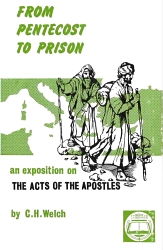From Pentecost to Prison (Acts)
/From Pentecost to Prison, by C. H. Welch
This is an exposition on the Acts of the Apostles. We need this historical account of what happened after the Lord's ascension until the time that the nation of Israel is set aside, so we can understand where the church started. Did the church find its beginning at Acts chapter 2, 9, 13, or 28? These questions and many others are addressed in this book.
What happened at Pentecost? What does the word Pentecost mean? Pentecost was a Jewish feast which was celebrated 50 days counting from the second day of the Passover. This feast in Acts is significant because the Holy Spirit gave gifts to those that were gathered in the upper room. This event was a fulfillment of prophesy.
The book of Acts explains that Israel lost her favored position because she rejected Christ as her Messiah. Acts also explains the reason for the sign gifts, Peter's message and its rejection, the stoning of Stephen, Cornelius' blessing and the conversion of the Apostle Paul. At Acts 28:28 we see the final pronouncement on Israel and the salvation of God being sent to the Gentiles.
Does the book of Acts reveal something completely new? Is the Kingdom of Heaven going to be restored to Israel at this time? When does (the church) have its beginning. Are we missing out on the miracles, sign gifts, and baptisms that were recorded during the Acts times? Many would tell us that we are in error for not claiming these things, but these things ceased being truth for today after Israel's rejection of her Messiah.
Mr. Welch says that we can see three "R's" discussed in Acts. The first is restoration - God's attempt to restore again the Kingdom to Israel. The second R is reconciliation - of Israel, the Gentile and the world. The last R is rejection - Israel's rejection of the Messiah and God's final rejection of her as a nation.
Why do we find a diminishing in the ministries of Peter and the twelve? Why was it necessary for Paul's commission to be enlarged? Mr. Welch believed that when we apply the principle of right division we are able to answer these questions as well as many others. God is offering us today a new and different hope. Will we believe and accept or will we be like Israel and reject THE ONE CALLING God is offering us today?
In conclusion, we think that Mr. Welch does an excellent job of explaining that the book of Acts is not a record of the Church's beginning, but rather an account of Israel's failure to receive her hope.




